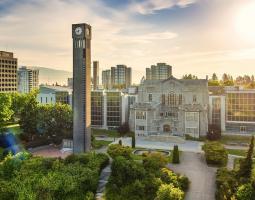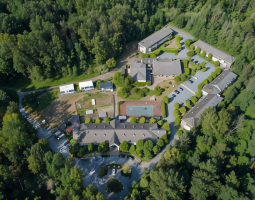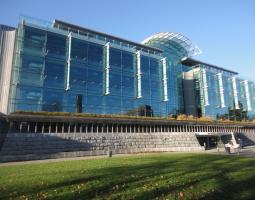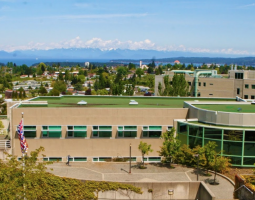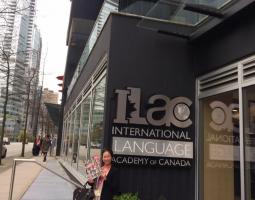UBC Summer Camp, University of British Columbia Summer Camp
Programs and prices, tuition fees in UBC Summer Camp, University of British Columbia Summer Camp
English Summer Course
- Age of students — from 10 to 19 years old,
- Course duration — from one week.
The summer program is aimed at improving your English language skills regardless of your current level. Students are given the opportunity to improve their reading, writing, speaking and listening skills in an English-speaking environment on the campus of one of the world's best universities.
The curriculum includes 15 hours of English lessons per week, taught by qualified native teachers. The modern approach to learning is based on interactivity, where a wide range of diverse topics, regular speaking practice, vocabulary building and fast listening comprehension play an important role. Studying in small groups allows students to receive individual attention from the teacher while practicing their speech with classmates when completing assignments, working on projects and outside the classroom.
The academic education is perfectly added by a variety of events: campus events for teams, field trips to study the history, architecture and natural beauty of Vancouver.
Description of UBC Summer Camp, University of British Columbia Summer Camp
- Location: Vancouver, Canada,
- Year of foundation: 1915,
- Student age: from 10 to 19 years old,
- Language of instruction: English,
- Type of education: mixed.
University of British Columbia, Vancouver — one of the top 20 universities in the world. Short-term programs focused on English language learning are organized on its Vancouver campus during the summer months.
Children aged 10 to 19 come here to obtain international learning experience, improve their language skills and have an exciting vacation while studying in Canada. Thanks to the multinational student community, a modern approach to teaching, a diverse balanced program and comprehensive support from staff, students will not only achieve outstanding results but also remember the trip for years to come.
Accommodation, meals, prices
The residence, located on the University of British Columbia campus, is equipped with 125 places for camp guests. Students are accommodated in single/double rooms, and children's proximity is regulated according to their age and gender. Each resident is provided with a bed, storage space, and a workspace. Bathrooms, living rooms, walking and sports areas, and a dining hall are shared facilities of the boarding house.
Students of summer programs are provided with daily three meals based on a balanced menu. The dishes consist of a set of quality products, offering variety: hot and cold portions, snacks, pastries, salads and more are served in the dining hall at certain hours. If a child has special dietary needs, the team of chefs will provide them with a suitable alternative menu.
Activities UBC Summer Camp, University of British Columbia Summer Camp
An extensive leisure program allows students to explore the surroundings of the campus, learn more about the history and traditions of local residents, try various foods, visit iconic places in the city and region. For example, during the week, students will go on several excursions:
- Whistler Village, gondola rides,
- Kitsilano Beach,
- Capilano Suspension Bridge,
- Vancouver Aquarium and Stanley Park,
- Granville Island.
Every day after academic classes, students participate in group activities, playing games, competing in sports, demonstrating their creativity and having fun, for example, by watching movies.
Advantages
- Studying on the campus of one of the world's best universities,
- A balanced schedule,
- Courses are available for children with any level of English proficiency,
- Many services are already included in the course price,
- Comfortable conditions for studying and living.
Facilities and equipment at UBC Summer Camp, University of British Columbia Summer Camp
The University of British Columbia campus is located a 30-minute drive from downtown Vancouver. Modern infrastructure offers students of summer programs the best conditions for learning and living:
- Comfortable residences,
- Classrooms with interactive equipment,
- A large dining hall,
- Relaxation areas in buildings and outdoor spaces,
- Sports grounds, a sports center with specialized halls and studios,
- A swimming pool,
- Self-study classrooms,
- A library.
Since the educational institution is a research center, there are many specialized laboratories with modern technologies and art centers on its territory.
The entire area occupied by the university is a shady green zone that includes a memorial Japanese garden, a world-class botanical garden, and Vancouver's only working farm.
Admission dates and extra charges
Summer courses on the University of British Columbia campus are usually organized from June to late July. The course duration varies from one to several weeks, allowing students to adapt the curriculum to their goals. The weekly schedule will include academic classes, campus events and excursions. At a certain time of the day, children wake up, visit the dining hall, go to bed; they have free hours for rest, hobbies and socializing with classmates.
Many services are already included in the program cost:
- Admission fee,
- Accommodation and meals,
- Campus events, excursions,
- Language tests,
- Academic classes, educational materials,
- Graduation certificate.
Additional costs will be required for:
- Airport transfers,
- Medical, travel insurance,
- Individual needs,
- Unaccompanied minor service,
- Pocket money.
Enrolment process
- Choosing a course, clarifying admission dates and conditions, availability of places,
- Completing the application form, submitting documents,
- Receiving an official invitation to study,
- Paying the full cost of the course,
- Arrival on campus: taking a language test, placement in classes and accommodation in residence, start of classes.
Perspectives
Upon completing the summer course, students not only receive a graduation certificate confirming their knowledge and current language level, but also gain international learning experience, friends from different countries, and broaden their horizons thanks to a variety of leisure activities. Living on the territory of University of British Columbia will allow students to imagine themselves as university students and understand whether they are ready for further English-language education.
Entry requirements, how to apply, what is required to enrol
To apply for short-term programs, children should have a package of personal documents: a foreign passport, health insurance, and a visa or residence permit to visit Canada. It is not necessary to take a language test in advance to check the level of knowledge, as upon arrival, enrolled students will be tested for English proficiency for placement into groups.
Institution on the map
Residence permits, citizenship and other services
- Guardianship services during the studies
- Student supervision
Review about UBC Summer Camp, University of British Columbia Summer Camp
Recommendations on when to apply
| Language courses, schools and children's language camps | Primary and secondary education - private schools | Preparation programmes for entering universities - higher education | Higher education (after completing accredited programs A-level, IB, High School) - Bachelor, Master, MBA |
| - we recommend to apply 6-9 months before the start of the course (some camps and schools offer discounts for early booking or for lengthy study programs) - there are some very popular and high demand children's camps, where the applications need to be submitted 1 year in advance (in particular Switzerland , Great Britain , USA , Canada , Austria) | - we recommend to apply one year before the start of the training program, - some schools have a specific time frame (September-November - please specify an individual school) - some schools require tests in several stages (UKISET, internal tests of the school: English, mathematics, logics, subjects, interview, some require a personal visit) | - we recommend to apply one year before the start of the program, - for Foundation and Pathway programs, IELTS and TOEFL certificates are usually required, respectively | - recommended submission one year before the start of the program, - the deadline normally closes in January, for TOP HEIs and, as a rule, in March in other universities - for a bachelor, a Foundation or Pathway preparatory program a completed A-level, IB, High School + IELTS / TOEFL are required - for Masters you need a graduated higher education, in some cases you need a pre-Masters program - MBA requires completed higher education, work experience preferably at least 2-3 years, etc. |



